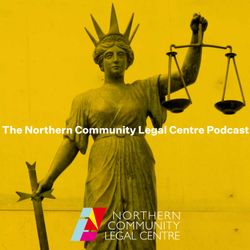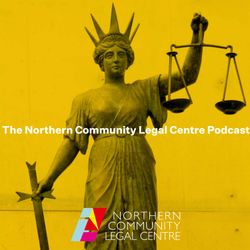Share

The Northern Community Legal Centre Podcast
Examining contemporary social issues through the lens of a community legal centre.
Latest episode

1. E01: Community and COVID
11:29||Season 1, Ep. 1In the first episode of our Podcast we speak with Professor Roger Wilkins from the University of Melbourne and NCLC Lawyer Cassandra Meade. We examine the impact of COVID-19 on the economic well-being of Victorian and we explore themes and findings from our COVID-19 Response legal clinic. TRANSCRIPTKATE DURMAN 00:00):Welcome to the Northern community legal center podcast. We'd like to acknowledge the traditional owners on the lands on which this podcast was recorded, the Wurundjeri people and pay our respects to elders past, present, and emerging.CASSANDRA MEADE (00:14):Excerpt from Cass "Fines are being issue to people who just don't have the ability to access that information "MORGAN WRIGHT (00:19):That was Cassandra Meade the community lawyer from our COVID clinic. We will hear from later in the episode, I am Morgan Wright. I'm the mental health support coordinator at Northern community legal center. In this episode, we will be discussing the most significant post-World war two event COVID-19. We will hear from economist, Roger Wilkins and community lawyer Cassandra Meade both offering unique experiences and understandings of COVID-19 impact on Victorians COVID-19. And the government's response to COVID has impacted all Australians, but some more than others to better understand economic wellbeing pre and post COVID in Australia. I spoke with economist, Roger Wilkins,ROGER WILKINS (01:03):My name's Roger Wilkins. I'm a professorial fellow at the Melbourne Institute of applied economic and social research at the university of Melbourne. My research areas are income inequality, poverty, and socioeconomic disadvantage, and the operation of labor markets. So the household income and labor dynamics in Australia survey is Australia's nationally representative longitudinal household study.ROGER WILKINS (01:29):So what that means is that we interview the same people every year. So we started in 2001 with 13,969 respondents from right across Australia. And we've been going back to them every year since to ask them a range of aspects of life in Australia, including their, their employment, their incomes, their health and wellbeing and a range of other aspects of, of life in in Australia. Our distinguishing feature is that because we are going back to the same people every year, we really get our moving picture of people's lives and how they evolve over time, which is something you don't get from any other survey in Australia. That's certainly that's representative of the Australian population. How do we measure in the household income and labor dynamics in Australia survey? How how satisfied people are, how happy people are.ROGER WILKINS (02:30):What we've been doing every year is simply asking them a range of questions about, about their satisfaction with various aspects of their life, but also just their life overall. And and it's simply that people are asked to report on a scale of zero to 10, where zero means completely dissatisfied and 10 means completely satisfied how satisfied overall they are with their, with their lives. And it's an, it's an amazingly powerful measure. It's, it's it's, it's been used internationally in, in many, many studies and, and it's been shown that this is is a very valid as a valid measure of, of, of how well off people feel like they are. And and certainly, you know, you see that, that, that measure is, is, is strongly impacted by employment health. The quality of our relationships Africa, how safely feel, and our degree of social connection actually also comes out as something that's really important to how often you interact socially with people outside of your own household, whether you participate in community sport or a community organization, these are all very strong contributors to our life satisfaction.ROGER WILKINS (03:46):And of course Relevant issue when when. Social interaction has been for much of this year significantly reduced because of the the responses to the public health responses to the coronavirus pandemic is something that really comes out strongly is that employment is extremely important to our wellbeing. And it's not just because of the income that that provides, although that's a really important mechanism by which employment improves your wellbeing, but beyond that it is associated with greater overall satisfaction with life. I think it speaks to the idea that we, that we need a purpose as people particularly at least amongst working age people, employment is extremely important. But it's also because we are social beings. And and so having employment is is a, is a marker of how others might regard us there's a certain stigma I suppose, associated with not being employed.ROGER WILKINS (04:58):And and, and, and I suppose your own self perception or your own sense of self-worth is it's, it's certainly improved by, by being able to provide for yourself and your family. And so it would a really does bear out that the the, the need for greater policy focus in that space because poor mental health is is a very strong predictor of, of of, of of people being in, not in dire circumstances, that the people who are probably most need based services also tend to have less ability to pay for them. And so this really calls for government funding of these services. So bringing them more into the Medicare system, I think, you know, with is, is what's really required in order to the people who most need these services, being able to access them.ROGER WILKINS (05:56):It's clear what Roger is saying, employment, social inclusion, and access to healthcare predictors of a person's wellbeing, people living in Hume, Moreland Mitchell pre COVID were already worse off than other LGAs in this state. The most hard done by being young people and single mothers, as Rogers stated mental health is strongly linked to Goodwill being prior to COVID the Northwest primary health network data found that people in the Northwest Metro of Melbourne are less likely to access mental health services for financial and cultural reasons. In my own work, as a mental health support coordinator, one of the main barriers myself and the people I work with have identified are that despite the increasing government funded sessions with a therapist through the better access scheme, the wait list for many bulk billing non-gap fee, psychologists would usually be two to three months at a minimum.ROGER WILKINS (06:52):It is not unusual for services to be booked out until April, 2021. Alarmingly lifeline has seen an increase in calls by 30% in Victoria and other mental health services are experiencing an influx of people requiring support. I know within the work I've undertaken at NCLC, that there is a growing number of people experiencing a higher level of isolation, as well as an exacerbation of existing mental health issues, fines, and unpaid debts can have a significant impact on people's wellbeing. As a response to this Northern community legal center started a COVID clinic to help support people with legal issues relating to COVID, including COVID fines. CAS has been working in this clinic sinceCASSANDRA MEADE (07:35):My name is Cassandra. I'm a community lawyer at the Northern community legal center. And I started with the Northern community legal center in September. And the COVID clinic started in October. My position is specifically in response to the COVID 19 pandemic, and the main fines people are coming to us without breach of directions. And usually I've found people are not, it's not in any way that are aware of what the restriction that they're breaching is. It's I was wearing a mask, I was running five kilometers. I just didn't know about the curfew. And that might be for any number of reasons, but it wasn't like they were aware of the restriction though, breaching that you showing of COVID fines has reflected whether or not people are actually like able to access the information about the restrictions. So I had at least two off, but I can think of who they just, like, they knew some of them, they didn't know the other's, but all of their circumstances together, they just weren't aware of that restriction. They definitely wouldn't have gone out, had they been aware but like that's not being taken into account. So they find is a big issue to people who just like don't have the ability to access that information. And then now I stuck with an extremely high fine that would take so long to pay.MORGAN WRIGHT (09:01):From what Cass is saying it is clear that the majority of people that we have been supporting with fines have had great difficulty accessing clear and concise information regarding the chief health officer's directions. This could be due to language barriers, limited access to technology. or both this issue is being compounded by the dynamic and ever changing nature of the rules and directions of the chief health officer to highlight the absurdity of some of these translation errors aspects of flyers distributed in Mitchell Shire were translated half in Arabic, the other half of the fly in Farsi, two different languages. It's clear that while the federal government has been effective in finding Victorians for breaching the directions of the chief health officer, the federal government has not been effective. At least not initially in educating people effectively of what those directions are. A lack of clear communication from the government, not only undermines the perceived legitimacy of their advice, but also exacerbates financial stress for some of Victoria's most vulnerable.MORGAN WRIGHT (10:02):The full impact of COVID-19 on Australians is yet to be determined at the time of recording. We are on the cusp of a potential third wave in Victoria. It is clear that COVID-19 has led to a decrease in people's overall wellbeing. Unfortunately, this is hit, Victoria's most vulnerable, the hardest by limiting their access to health and psychological services, as well as limiting employment opportunities. Thank you for listening to the NCLC podcast. If you also want to know is experiencing legal issues and cannot afford legal representation, please contact nine three one zero four three seven six. If you are currently feeling isolated and require psychological support, you can contact beyond blue on (180) 051-2348. Or if you're experiencing suicidal thoughts, you can contact lifeline on one three, one, one, one for a script of this episode can be found on Northernclc.org.au, as well as a list of sources for facts featured in this episode. Special, thanks to professor Roger Wilkins from the university of Melbourne for being a part of our podcast. REFERENCES https://www.abc.net.au/news/2020-11-17/covid-related-mental-illness-wont-peak-until-mid-next-year/12891862 https://theconversation.com/when-its-easier-to-get-meds-than-therapy-how-poverty-makes-it-hard-to-escape-mental-illness-114505 https://www.abc.net.au/news/2020-08-13/coronavirus-messages-translated-to-nonsense-in-other-languages/12550520 https://melbourneinstitute.unimelb.edu.au/hilda
More episodes
View all episodes
No data